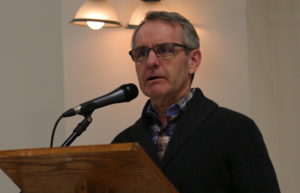Espinal case in Honduras an ‘affront,’ MP says

MP Bruce Stanton (PC – Simcoe North) speaks at Honduras community meeting in April 2018
By Kate Harries Springwater News January 10 2010
At any given time there are about 100 cases of Canadians or their relatives imprisoned in foreign countries, MP Bruce Stanton says, but none that he has been involved with has been as difficult as Edwin Espinal’s.
Espinal, the husband of Karen Spring of Elmvale, is a human rights activist in Honduras who worked closely with, among others, Berta Caceres, the indigenous leader who was assassinated in 2016. He has been held on trumped-up charges in a military prison for almost a year in starkly inhumane conditions with insufficient water, food and medical attention.
“We want to see a proper course of justice followed here,” the MP for Simcoe North said in an interview Monday. People who are accused should get due process and their day in court, and not be held “in such terrible 19thcentury like conditions,” he said.
“Against all of that, you have this wonderful family, standing up for what’s right,” he added. Stanton praised the Springs – Karen, who stays in Honduras despite the danger to herself (“Honduras is no picnic,” he noted) as well as her family, particularly her parents Janet and John Spring.
His office is “trying to help them in every way we can, we’re equally frustrated.”
He said his frustration is directed not so much at the Canadian government as at the Honduran government, “the officials in Honduras who have a great opportunity here to be a much better citizen on the world stage and for any number of reasons, they’re just not seeing the way to do that.”
Stanton said the development aid that Canada sends to Honduras doesn’t go to the government, but to civil society groups that are working to improve governance and legal systems there. But “that’s a long-term situation,” he said, “it just doesn’t turn around overnight. Anyway you cut this, it is terrible.”
He noted that the caravan of refugees fleeing Honduras demonstrates how awful life there has become – under an oppressive state and “militia-like” army and police. “So much corruption and political influence, it’s just a terrible scenario on just about every measure.”
Asked whether there’s a point at which a country’s treatment of its citizens puts it beyond the pale, and whether Honduras is a country with which Canada should not be having good relations, Stanton agreed.
“You’re right about that,” he said. “Canada needs to be honest and forthright in saying so when they have the opportunity to do so. I think that has been the message conveyed through our diplomats that are on the ground there.”
He said he believes Canadian diplomats have expressed the view that “the actions of the Honduran government in this case is really an affront to all the things that we’re working together on to make the judicial system more independent.”
He’s not clear on how that view is conveyed. “I’m told that that is basically what Canada does. Have they done so in public way? Not yet.”
It is up to Foreign Affairs Minister Chrystia Freeland and her officials to decide when and if to go public with criticism – but the decision is a difficult one, as Espinal could face retaliation, Stanton said.
He emphasized that the Spring family has Freeland’s attention (even though they have not discussed their concerns directly with her).
The fact that when Janet Spring was in Ottawa earlier this month, she was able to meet with Foreign Affairs officials on a couple of days’ notice, is evidence of that, he said.
What to do now?
“Much as it seems like tilting at windmills at times, the continued attention and pressure, the emails, the letters, the petition – all of these things actually help keep a certain amount of tension from the public upon the Ministry of Foreigh Affairs,” he said. “I think one has to continue with that… Keeping this thing at the front burner as far as the ministry is concerned is probably the single best approach you can take.”
The more pressure is brought to bear by the public, the more effective Canadian diplomats can be, he said.
As is detailed elsewhere in this newspaper, Janet Spring left for Honduras on Tuesday. Hopes for Espinal to be released as part of an amnesty for political prisoners, one of the recommendations that came out of a dialogue process mediated by the United Nations, were dashed in December when the Honduran government refused to put the recommendations through congress.
Spring will address a meeting to update the community on Sunday January 27 2019, from 2 to 5 pm at the Elmvale Community Hall.
An online petition to the House of Comons sponsored by Barrie–Springwater–Oro- Medonte MP Alex Nuttall is available to be signed until February 7 2019. https://petitions.ourcommons.ca/en/Petition/Details?Petition=e-1868
Nuttall could not be reached for comment for this article.
For more information, go to the Simcoe Honduras Rights Monitor https://simcoecountyhondurasrightsmonitor.wordpress.com









Leave a Reply